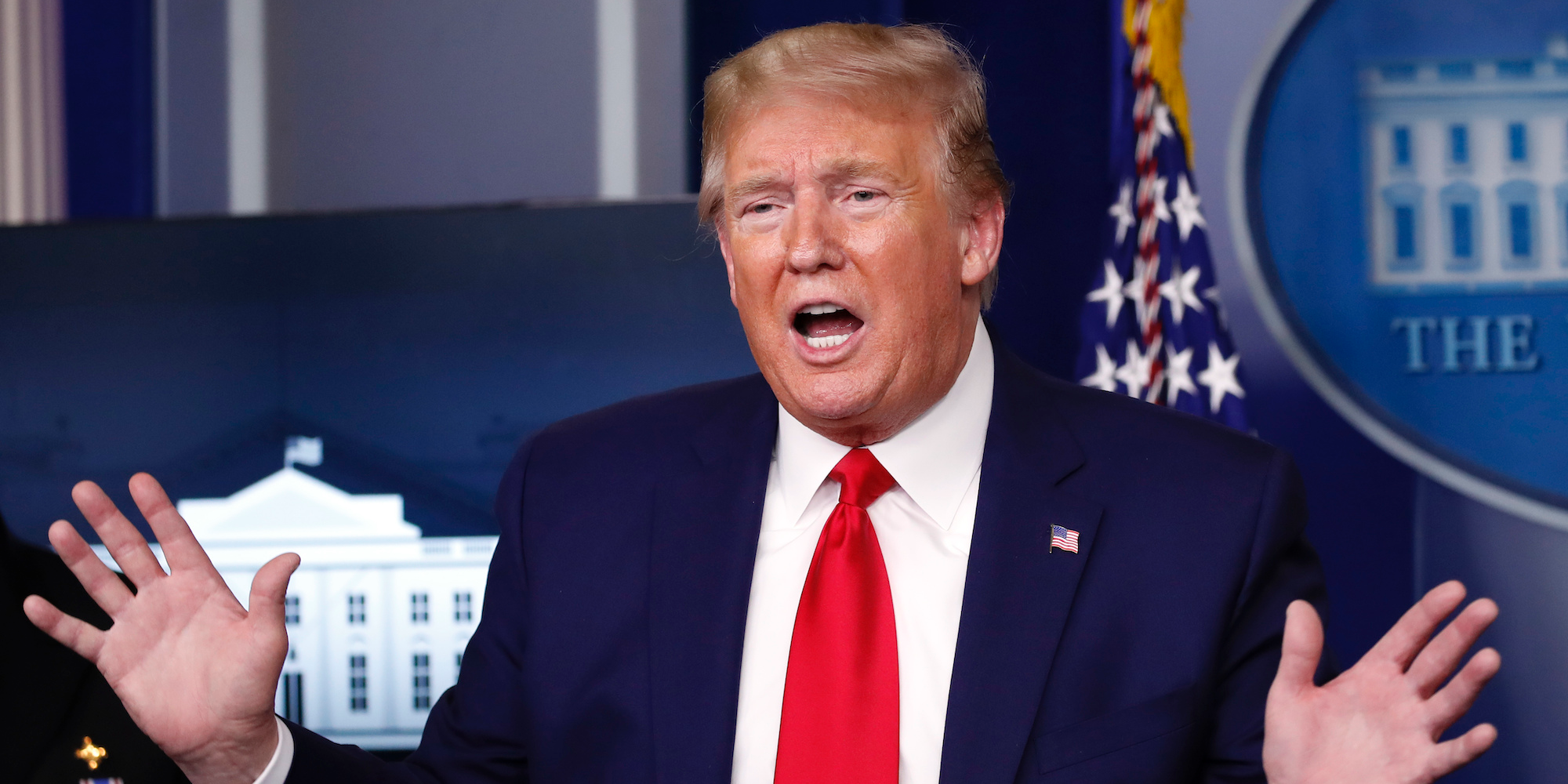- A New York Times analysis has found that Trump uses his coronavirus briefings to praise himself and his government’s response, far more than he praises others or offers messages of national unity and empathy.
- Between March 9 and April 17, Trump spoke over 260,000 words at the briefings, the Times found. Nearly four times more statements were devoted to praising himself than offering condolences to victims of the coronavirus.
- A separate Washington Post analysis of Trump’s speaking time from April 6 – 24, found that out of 13 hours of speaking time, Trump only devoted 4 1/2 to condolences.
- The White House has reportedly considered ending the daily coronavirus briefings. Monday’s scheduled press conference has been cancelled.
- Visit Business Insider’s homepage for more stories.
As White House reportedly considers lowering the curtains on its daily coronavirus task force briefings, two new analyses found that the president primarily used the briefings to praise himself and his government’s response, rather than offering a message of healing to the country.
A New York Times analysis found that Trump spoke about 260,000 words at the daily coronavirus task force briefings between March 9 and April 17. During the briefings, he praised his own performance or his government’s nearly four times more than he expressed empathy for victims or appealed to a sense of national unity.
Trump praised himself or his government’s response to the crisis about 600 times, the Times found, sometimes based on false or misleading information. In contrast, the president made appeals to national unity or expressed empathy for coronavirus victims roughly 160 times.
The president offered praise to others for their work over 360 times, but also blamed others more than 110 times for their actions, according to the Times.
A separate analysis conducted by the Washington Post broke down Trump's speaking time from April 6 - 24, and found that he'd spoken for about 13 hours in total. Just 4 1/2 minutes were devoted to offering condolences to victims of the virus.
Disinformation was far more plentiful than consolation. About a quarter of Trump's remarks during that time period have included false or inaccurate information, the Post showed.
Trump did include statements praising Americans' resilience, and the work of medical experts around the country.
"I want to start by saying that our hearts go out to the people of New York as they bear the brunt of the coronavirus pandemic in America," he said on April 3.
But far more often, the president's briefings prompted extensive fact checks and generated headlines about his gaffes and clashes with medical experts and reporters, rather than the administration's actual response to the coronavirus crisis.
From the podium, Trump repeatedly undercut his top infectious disease expert, Dr. Anthony Fauci, on whether an anti-malaria drug also used to treat lupus patients called hydroxychloroquine could be used to treat the coronavirus. In one March incident, Fauci urged caution that the treatment had not yet been cleared by clinical studies, while Trump said he was a "big fan" of the treatment. The Food and Drug Administration has since cautioned against using the drug to treat COVID-19 patients outside of hospital or clinical settings.
The president set off bipartisan alarm when he claimed on April 13 that he had "total" authority to force governors to lift their lockdown restrictions, when in fact he does not.
He has belittled journalists who press him on his statements, such as an incident on April 3 when he told CBS News' Weijia Jiang she'd used a "nasty tone" after she asked him to clarify comments made by his son-in-law, Jared Kushner, about the national strategic stockpile.
As recently as last Thursday, Trump mused without any medical evidence that ultra-violet light could be "brought...inside the body" or that because "disinfectant" was known to kill the virus, doctors might find a way "a way you can do something like that by injection inside, or almost a cleaning."
Medical experts and cleaning product manufacturers scrambled to issue statements that disinfectants like bleach should never, ever be consumed or injected. On Friday, his press secretary Kayleigh McEnany said he'd been taken out of context, while the president insisted he was being sarcastic.
That day, Trump left the briefing after his prepared remarks and did not take questions from the press.
On Monday morning, White House cancelled the day's scheduled press briefing.
